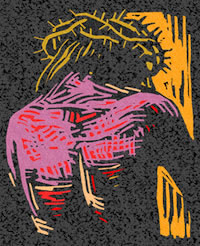
Passion (Palm) Sunday Year C
Today’s liturgy begins with the familiar commemoration of the triumphant entry of Jesus into Jerusalem. This year we hear Luke’s account. Its majestic tone is an appropriate prelude to the greatest week of the Church’s year – emphasising the unique authority of Jesus, and ending with the joyous cry of ‘the whole group of disciples’: proclaiming that the miracles worked by Jesus are a breaking in of ‘heaven’ itself. In Luke’s account, his preoccupation with the issues of riches and poverty finds expression; it is not palms but ‘cloaks’ – the proud possessions of the rich – that are spread on the road.
The reading from Isaiah invites us to learn from the example of the Saviour, the trust we should have in our Father in heaven, whatever trials we may face. But it is something else that makes the reading an appropriate one, as we find ourselves on the threshold of Holy Week – with God’s true Servant, we must have minds and hearts open to a new meeting with our God in what lies ahead. Like him we should be glad that the Lord ‘wakes us to hear, to listen like disciples’
In the second reading, from the letter to the Philippians – echoing a hymn used in the liturgy of the first generation of the Church – Paul summarises with majestic brevity the drama of the Paschal Mystery we are about to celebrate: how Jesus ‘emptied himself’, shared our human condition, even to ‘accepting death on a cross’, and how finally, for our sake, he is ‘raised high’, one with the Father in the glory of the divine name.
Luke’s account of the Lord’s passion has been put together with great care, as this faithful disciple of Jesus makes reference in the course of his narrative to many of his favourite themes: the example of Jesus’ prayer during his ordeal (on Calvary; for Peter); the good news of a merciful and forgiving God (‘Father forgive them’; ‘Today you will be with me in paradise’); the attitudes of true discipleship (‘The leader must be as one who serves’; the presence of the disciples, men and women, on Calvary – ‘at a distance’); the great titles of the Church’s confession of faith in the Saviour are skilfully woven into the narrative, often on the lips of those who are rejecting him (‘Son of Man’, ‘Son of God’, ‘Christ of God’, ‘King of the Jews’, ‘Chosen One’; and significantly it is the gentile centurion who is given the final word, ‘This was a great and good man’).
The liturgies of Holy Week will teach us, not with fine oratory, but by recounting the great events in which the divine Truth found expression in our human history. Let this recognition set the tone for our participation in the liturgies of these days.
John Thornhill sm

